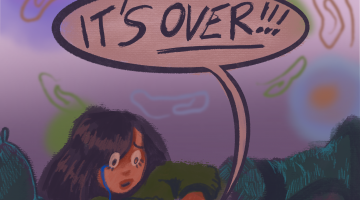When I called my father to congratulate him on his 50th birthday, he replied with distraught that when he was a child, he wished he never live past fifty. After fifty, life is an arduous pitfall.
My father’s idea of aging was just as intimidating and depressing as dying, for aging was a vicious gift of extended burden brimming with ailments, impairments and limitations. And if my father is anything like my reader’s parents, this monologue is not surprising. Fortunately, studies on the aging brain shed hope to an otherwise inescapable fate known as old age.
The brain ages just as the skin wrinkles and the vision blurs. One ability the brain loses is its executive function or its effectiveness to plan, manage, control and execute orders. Primary cognitive disorders like dementia type two, Alzheimer’s, schizophrenia, and alcohol-related impairments are associated with the loss of functioning neurons in this area.
According to the International Journal of Geriatric Psychiatry, secondary cognitive disorders such as squalor, self-neglect and hoarding behaviors arise from severe deterioration of the brain’s frontal lobe. One study published in the International Journal of Geriatric Psychology concluded that the subjects with greater cognitive disorders due to executive dysfunction lacked mental flexibility and had difficulties establishing order and imposing structure on situations.
I finally understood what my father feared. He was terrified of losing his autonomy, his identity. Aging seems to wipe the brain’s whiteboard, leaving minuscule traces of who the person used to be.
Perhaps my father was not overreacting, and aging is an imminent burden to anyone that reaches sixty-five and older. Fortunately, scientists have found that the brain is capable of compensating for this inevitable disadvantage.
One theory, explained by Frontiers in Human Neuroscience, suggests that older brains will try to recruit more neurons from nearby networks in order to plan and manage tasks, a process called cognitive reserve. The neural network can expand into other areas that were not previously used for that purpose. These compensatory mechanisms allow cognitive preservation among the elderly, even though it decreases the efficiency of the person’s performance.
My father is nearing his sixties and has finally abandoned his dismay about getting older. Along the way, he discovered that his brain could also adapt to his growing age by just using more of it. He has decided to retire to the countryside where he intends to harvest lemons and raise chickens.
Less radical alternatives include playing brain games that help us exercise the frontal lobe. According to a randomized controlled trial called PLoS One, these types of activities stimulate and exercise the frontal cortex as well as further improve attention and visuospatial abilities. Aging does not have to be a cruel joke, but an opportunity to expand the brain’s potential. As we witness more of our older population dye their hair naturally to a silver hue, I think we need to assure them that old age is not the debt they pay for living. If our brains can adapt to this journey through life, so can our ideas of what aging means. My father is determined to learn how to become a farmer. To me, old age is not a disease waiting-to-happen; it’s life opening another door.
Opinions expressed in The Nevada Sagebrush are solely those of the author and do not necessarily express the views of The Sagebrush or of its staff. Sara Gallego studies community health sciences and communications and can be reached at jaceygonzalez@sagebrush.unr.edu and on Twitter @NevadaSagebrush.










